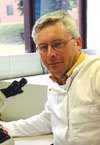 Like most stem cell biologists, Helen Mardon obtained her first cell lines from someone she knew. Later, when she needed more material, she chose to pay for a line from a commercial dealer. Eventually, the Oxford Stem Cell Institute co-director derived her own in-house human embryonic stem cell core from embryos donated by in vitro fertilization patients.
Like most stem cell biologists, Helen Mardon obtained her first cell lines from someone she knew. Later, when she needed more material, she chose to pay for a line from a commercial dealer. Eventually, the Oxford Stem Cell Institute co-director derived her own in-house human embryonic stem cell core from embryos donated by in vitro fertilization patients.
Mardon could have gotten human embryonic stem cell (hESC) lines for the cost of delivery from the UK Stem Cell Bank (SCB), one of a handful of stem cells banks worldwide (See A bank in England for stem cells). Supported by government funds, the bank stores, distributes and provides ethical oversight of hESC lines in Britain free of charge to academic and commercial researchers. The samples they distribute are top notch: a half-dozen bench researchers screen their stocks to ensure banked lines are free from viral infections or mycoplasma contamination, and routine checks are also completed before lines are shipped. But for now, Mardon says, “going through the bank just adds a huge layer of paperwork and bureaucracy”.